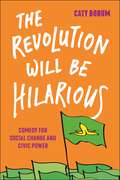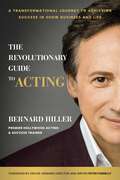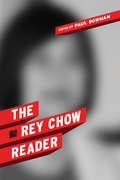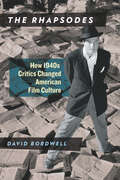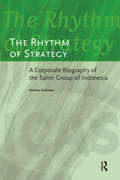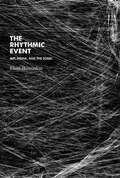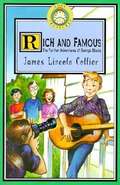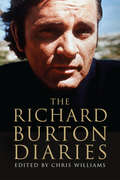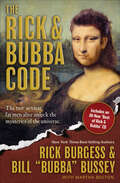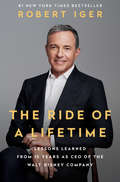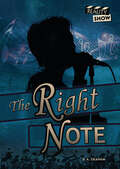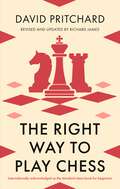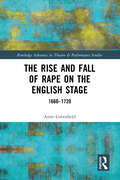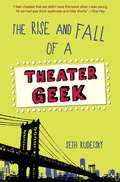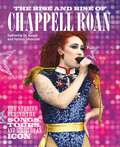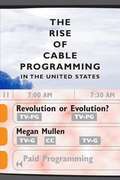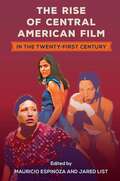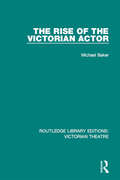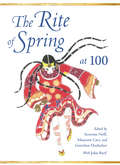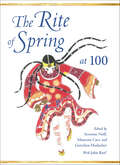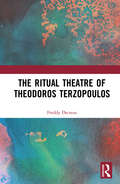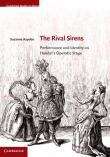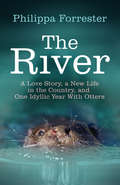- Table View
- List View
The Revolution Will Be Hilarious: Comedy for Social Change and Civic Power (Postmillennial Pop #29)
by Caty BorumAn insider’s look at the power of comedy to effect social changeFrom Trevor Noah’s The Daily Show and Hasan Minhaj’s Patriot Act, to Issa Rae’s Insecure and Corey Ryan Forrester’s Twitter feed, today’s multi-platform comedy refuses to shy away from the social issues that define our time.As more comedians lean into social justice activism, they help reshape the entertainment industry and offer creative, dynamic avenues for social change. The Revolution Will Be Hilarious offers a compelling insider’s look at how comedy and social justice activists are working together in a revolutionary media moment. Caty Borum invites readers into an expanding, enterprising arena of participatory culture and politics through in-depth interviews with comedians, social justice leaders, and Hollywood players. Their insights shed light on questions such as: What role does comedy play in helping communities engage the public with challenging social issues? How do social justice organizations and comedians co-create entertaining comedy designed to build the civic power of marginalized groups? And how are entertainment industry leaders working with social justice organizations to launch new comedy as both entertainment and inspiration for social change?Through this exploration, Borum argues that building creative power is crucial for marginalized groups to build civic power. The Revolution Will Be Hilarious positions the rise of social justice comedy as creative, disruptive storytelling that hilariously invites us to agitate the status quo and re-imagine social realities to come closer to the promise of equity and justice in America.
The Revolutionary Guide to Acting: A Transformational Journey to Achieving Success in Show Business and Life
by Bernard HillerBecome the actor you must be to turn your dreams into reality. For over 25 years, Bernard Hiller&’s revolutionary techniques and exercises have produced unprecedented success for actors, artists, and performers all around the world. Acting is always evolving, and in The Revolutionary Guide to Acting Bernard shares the latest methods to help you gain vital skills for success in this competitive industry. Set yourself apart at your next audition by using Bernard&’s unique techniques, and uncover the secrets to delivering unforgettable performances. Acting is a journey to self-awareness that will lead you to discover your true authenticity, empowering you to become unstoppable in show business. Cultivate the tools you will need for a long-lasting career and, ultimately, a more accomplished and happier life.
The Rey Chow Reader
by Rey ChowRey Chow is arguably one of the most prominent intellectuals working in the humanities today. Characteristically confronting both entrenched and emergent issues in the interlocking fields of literature, film and visual studies, sexuality and gender, postcolonialism, ethnicity, and cross-cultural politics, her works produce surprising connections among divergent topics at the same time as they compel us to think through the ethical and political ramifications of our academic, epistemic, and cultural practices. This anthology - the first to collect key moments in Chow's engaging thought - provides readers with an ideal introduction to some of her most forceful theoretical explorations. Organized into two sections, each of which begins with a brief statement designed to establish linkages among various discursive fields through Chow's writings, the anthology also contains an extensive Editor's Introduction, which situates Chow's work in the context of contemporary critical debates. For all those pursuing transnational cultural theory and cultural studies, this book is an essential resource.
The Rhapsodes: How 1940s Critics Changed American Film Culture
by David BordwellPauline Kael, Andrew Sarris, and Roger Ebert were three of America's most revered and widely read film critics, more famous than many of the movies they wrote about. But their remarkable contributions to the burgeoning American film criticism of the 1960s and beyond were deeply influenced by four earlier critics: Otis Ferguson, James Agee, Manny Farber, and Parker Tyler. Throughout the 1930s and '40s, Ferguson, Agee, Farber, and Tyler scrutinized what was on the screen with an intensity not previously seen in popular reviewing. Although largely ignored by the arts media of the day, they honed the sort of serious discussion of films that would be made popular decades later by Kael, Sarris, Ebert and their contemporaries. With The Rhapsodes, renowned film scholar and critic David Bordwell--an heir to both those legacies--restores to a wider audience the work of Ferguson, Agee, Farber, and Tyler, critics he calls the "Rhapsodes" for the passionate and deliberately offbeat nature of their vernacular prose. Each broke with prevailing currents in criticism in order to find new ways to talk about the popular films that contemporaries often saw at best as trivial, at worst as a betrayal of art. Ferguson saw in Hollywood an engaging, adroit mode of popular storytelling. Agee sought in cinema the lyrical epiphanies found in romantic poetry. Farber, trained as a painter, brought a pictorial intelligence to bear on film. A surrealist, Tyler treated classic Hollywood as a collective hallucination that invited both audience and critic to find moments of subversive pleasure. With his customary clarity and brio, Bordwell takes readers through the relevant cultural and critical landscape and considers the critics' writing styles, their conceptions of films, and their quarrels. He concludes by examining the profound impact of Ferguson, Agee, Farber, and Tyler on later generations of film writers. The Rhapsodes allows readers to rediscover these remarkable critics who broke with convention to capture what they found moving, artful, or disappointing in classic Hollywood cinema and explores their robust--and continuing--influence.
The Rhythm of Images: Cinema beyond Measure (Cultural Critique Books)
by Domietta TorlascoA rigorous and imaginative inquiry into rhythm&’s vital importance for film and the moving imageFocusing attention on a concept much neglected in the study of film, The Rhythm of Images opens new possibilities for thinking about expanded perception and idiosyncratic modes of being. Author Domietta Torlasco engages with both philosophy and cinema to elaborate a notion of rhythm in its pre-Socratic sense as a &“manner of flowing&”—a fugitive mode that privileges contingency and calls up the forgotten fluidity of forms. In asking what it would mean to take this rhythm as an ontological force in its own right, she creatively draws on thinkers such as Giorgio Agamben, Roland Barthes, Gilles Deleuze, and Luce Irigaray. Rhythm emerges here as a form that eludes measure, a key to redefining the relation between the aesthetic and the political, and thus a pivotal means of resistance to power.Working with constellations of films and videos by international artists—from Michelangelo Antonioni, Jean-Luc Godard, and David Lynch to Harun Farocki and Victor Burgin, among others—Torlasco brings to bear on them her distinctive concept of rhythm with respect to four interrelated domains: life, labor, memory, and medium. With innovative readings of artworks and critical texts alike, The Rhythm of Images fashions a vibrant, provocative theory of rhythm as the excess or potential of perception. Ultimately, the book reconceives the relation between rhythm and the world-making power of images. The result is a vision of cinema as a hybrid medium endowed with the capacity not only to reinvent corporeal boundaries but also to find new ways of living together.
The Rhythm of Strategy: A Corporate Biography of the Salim Group of Indonesia (ICAS Publications series)
by Marleen DielemanThis book provides a well-documented analysis of the strategy of the Salim Group, one of the largest family conglomerates in Southeast Asia. Using a multitude of sources, including interviews with the Salim family and Salim Group managers, the author provides a comprehensive corporate biography of this fascinating family firm. The Rhythm of Strategy: A Corporate Biography of the Salim Group of Indonesia criticises existing theories on ethnic Chinese firms and instead provides a more nuanced view of the evolution of a small migrant trading business into the largest family business group in Southeast Asia. It argues that the strategy of this group oscillated irregularly between a business model built on connections and a professional business model adapted to markets. Due to its size and closeness to the Suharto regime, the Salim Group has played an important role in shaping Indonesia’s economy.
The Rhythmic Event
by Eleni IkoniadouAn investigation into the affective modes of perception, temporality, and experience enabled by experimental new media sonic art.
The Rich and Famous: The Further Adventures of George Stable
by James Lincoln CollierAfter being discovered during a six-second spot on television, George Stable is now being groomed into the hot new singing sensation, "The Boy Next Door." Unfortunately, his dad has other plans for him for the summer, so George must weave a wacky web of deception - that might just get him killed! - in order to get his music career off the ground.
The Richard Burton Diaries
by Chris WilliamsIrresistibly magnetic on stage, mesmerizing in movies, seven times an Academy Award nominee, Richard Burton rose from humble beginnings in Wales to become Hollywood's most highly paid actor and one of England's most admired Shakespearean performers. His epic romance with Elizabeth Taylor, his legendary drinking and story-telling, his dazzling purchases (enormous diamonds, a jet, homes on several continents), and his enormous talent kept him constantly in the public eye. Yet the man behind the celebrity façade carried a surprising burden of insecurity and struggled with the peculiar challenges of a life lived largely in the spotlight. This volume publishes Burton's extensive personal diaries in their entirety for the first time. His writings encompass many years—from 1939, when he was still a teenager, to 1983, the year before his death—and they reveal him in his most private moments, pondering his triumphs and demons, his loves and his heartbreaks. The diary entries appear in their original sequence, with annotations to clarify people, places, books, and events Burton mentions. From these hand-written pages emerges a multi-dimensional man, no mere flashy celebrity. While Burton touched shoulders with shining lights—among them Olivia de Havilland, John Gielgud, Claire Bloom, Laurence Olivier, John Huston, Dylan Thomas, and Edward Albee—he also played the real-life roles of supportive family man, father, husband, and highly intelligent observer. His diaries offer a rare and fresh perspective on his own life and career, and on the glamorous decades of the mid-twentieth century.
The Rick & Bubba Code
by Martha Bolton Rick Burgess Bill "Bubba" BusseyDecipher the wacky worldview of the famous radio DJs (and bestselling authors) as they take on relationships, family, physical fitness, religion, and life.Zany radio hosts Rick & Bubba rocketed onto the New York Times bestseller list with their first book, Rick & Bubba’s Expert Guide to God, Country, Family, and Anything Else We Can Think Of. Now Rick & Bubba are back, and this time the world truly isn’t safe.In The Rick & Bubba Code, Rick and Bubba tackle subjects ranging from the South, politics, and romance to manhood, in-laws, and political correctness. Now cow is sacred. No hold is barred. Laugh along with the “sexiest fat men alive” as they uncover the mysteries of the universe.
The Ride of a Lifetime: Lessons Learned from 15 Years as CEO of the Walt Disney Company
by Robert IgerA grand vision defined: The CEO of Disney, one of Time’s most influential people of 2019, shares the ideas and values he embraced to reinvent one of the most beloved companies in the world and inspire the people who bring the magic to life. Robert Iger became CEO of The Walt Disney Company in 2005, during a difficult time. Competition was more intense than ever and technology was changing faster than at any time in the company’s history. His vision came down to three clear ideas: Recommit to the concept that quality matters, embrace technology instead of fighting it, and think bigger—think global—and turn Disney into a stronger brand in international markets. Twelve years later, Disney is the largest, most respected media company in the world, counting Pixar, Marvel, Lucasfilm, and 21st Century Fox among its properties. Its value is nearly five times what it was when Iger took over, and he is recognized as one of the most innovative and successful CEOs of our era.In The Ride of a Lifetime, Robert Iger shares the lessons he’s learned while running Disney and leading its 200,000 employees, and he explores the principles that are necessary for true leadership, including:• Optimism. Even in the face of difficulty, an optimistic leader will find the path toward the best possible outcome and focus on that, rather than give in to pessimism and blaming.• Courage. Leaders have to be willing to take risks and place big bets. Fear of failure destroys creativity. • Decisiveness. All decisions, no matter how difficult, can be made on a timely basis. Indecisiveness is both wasteful and destructive to morale. • Fairness. Treat people decently, with empathy, and be accessible to them. This book is about the relentless curiosity that has driven Iger for forty-five years, since the day he started as the lowliest studio grunt at ABC. It’s also about thoughtfulness and respect, and a decency-over-dollars approach that has become the bedrock of every project and partnership Iger pursues, from a deep friendship with Steve Jobs in his final years to an abiding love of the Star Wars mythology. “The ideas in this book strike me as universal” Iger writes. “Not just to the aspiring CEOs of the world, but to anyone wanting to feel less fearful, more confidently themselves, as they navigate their professional and even personal lives.”
The Right Note (Reality Show)
by D. A. GrahamEve and Ryan have been a music duo ever since they were little. Eve's voice contrasts with Ryan's creative and edgy musical style, making them a perfect pairing. They decide to audition for The Right Note, a reality music competition, hoping to get their big break. But when the show starts and they are forced to compete against each other, their relationship is tested and they begin to question their musical skills. Will either of them be strong enough musicians to compete on their own? And will they still be a duo at the end of the show?
The Right Way to Play Chess
by David PritchardSince its first publication in 1950, The Right Way to Play Chess has taught chess to generations of beginners, taking them to the standard expected of good club players.It gives full details of exactly how to play the game, explains basic theory and includes many examples of play.There are separate chapters on the openings, middle and end games, plus a chapter of master games which illustrate how styles of play have changed over the years.Fully revised and updated by chess expert Richard James, a new chapter shows how to encourage and teach children to play the game.
The Rise and Fall of Rape on the English Stage: 1660–1720 (ISSN)
by Anne GreenfieldThis book examines one of the most pervasive and successful dramatic tropes of the Restoration and early eighteenth century: sexual violence.During this sixty-year span, there were over fifty tragic and tragi-comedic productions that showcased rape and/or attempted rape—a remarkable number that was unprecedented in English dramatic history. Rape was not merely depicted more frequently during the Restoration, but it was also placed at the center of more plots, given more pathetic emphasis, and even staged more centrally. Restoration dramatists were the first to revolve routinely entire plots around the rapes of their innocent heroines, to give powerful voices to these heroines post-rape, and to imbue their sexually violent scenes with new and attention-getting staging techniques, such as discovery scenes. As this book argues, sexual violence emerged at this time as a highly flexible dramatic trope that could be used to illustrate terrifying political scenarios, elicit extreme pathos in audiences, and demonstrate the bearing that lost chastity had on social stability. It is precisely the rich, multi-faceted appeal of these productions—politically, sexually, visually, and culturally—that explains the popularity and significance of this dramatic trope on the English stage.This book will be of interest to students and scholars in Restoration, eighteenth-century studies, and theatre and performance studies.
The Rise and Fall of a Theater Geek
by Seth Rudetsky<P>Broadway, New York. The shows, the neon lights . . . the cute chorus boys! It's where Justin has always wanted to be--and now, with a winter internship for a famous actor, he finally has his chance to shine. If only he could ditch his kind, virtuous, upright, and--dare he say it?--uptight boyfriend, Spencer. <P>But once the internship begins, Justin has more to worry about than a cramped single-guy-in-the-city style. Instead of having his moment in the spotlight, he's a not-so-glorified errand boy. Plus, Spencer is hanging out with a celebra-hottie, Justin's best friend Becky isn't speaking to him, and his famous actor boss seems headed for flopdom. Justin's tap-dancing as fast as he can, but all his wit and sass might not be enough to switch his time in New York from nightmare-terrible to dream-come-true terrific. <P>Seth Rudetsky's second YA novel is endearingly human, laugh-out-loud funny, and for any kid who's ever aspired to Broadway but can only sneak in through the stage door.
The Rise and Rise of Chappell Roan: The Stories Behind the Songs, Tours, and Birth of an Icon
by Hamza Jahanzeb Katherine St. AsaphFilled with lush photography and behind-the-scenes detail on Chappell Roan&’s entire career from a small-town singer to queer icon and music superstar, this is the definitive look at an era-defining artist. Uncover the untold full story behind the songs, looks, and noteworthy live performances by Chappell Roan in this definitive guide. Covering everything from her raw demos to her dazzling recent albums and featuring exclusive insight into her debut Midwest Princess tour, this book offers an in-depth exploration of Chappell Roan&’s artistic evolution over the past ten years. Complete with stunning images of her outfits, instruments, and mementos, the book delves into the origins, inspiration, and production of Chappell Roan&’s iconic look and sound. For fans and music enthusiasts alike, this is a comprehensive and inspiring portrait of an artist who fearlessly pushes boundaries and continues to shape the future of pop music.
The Rise of Cable Programming in the United States: Revolution or Evolution?
by Megan MullenIn 1971, the Sloan Commission on Cable Communications likened the ongoing developments in cable television to the first uses of movable type and the invention of the telephone. <P><P>Cable's proponents in the late 1960s and early 1970s hoped it would eventually remedy all the perceived ills of broadcast television, including lowest-common-denominator programming, inability to serve the needs of local audiences, and failure to recognize the needs of cultural minorities. Yet a quarter century after the "blue sky" era, cable television programming closely resembled, and indeed depended upon, broadcast television programming. Whatever happened to the Sloan Commission's "revolution now in sight"?
The Rise of Central American Film in the Twenty-First Century (Reframing Media, Technology, and Culture in Latin/o America)
by Mauricio Espinoza Jared ListHow an overlooked film industry became a cinematic force The first book in English dedicated to the study of Central American film, this volume explores the main trends, genres, and themes that define this emerging industry. The seven nations of the region have seen an unprecedented growth in film production during the twenty-first century with the creation of over 200 feature-length films compared with just one in the 1990s. This volume provides a needed overview of one of the least explored cinemas in the world. In these essays, various scholars of film and cultural studies from around the world provide insights into the continuities and discontinuities between twentieth- and twenty-first-century cinematic production on the Isthmus. They discuss how political, social, and environmental factors, along with new production modes and aesthetics, have led to a corpus of films that delve into issues of the past and present such as postwar memory, failed revolutions, trauma, migration, popular culture, minority populations, and gender disparities. From Salvadoran documentaries to Costa Rican comedies and Panamanian sports films, the movies analyzed here demonstrate the region’s flourishing film industry and the diversity of approaches found within it. The Rise of Central American Film in the Twenty-First Century pays homage to an overlooked cultural phenomenon and shows the importance of regional cinema studies.Contributors: Liz Harvey-Kattou | Daniela Granja Núñez | Carolina Sanabria | Juan Carlos Rodríguez | María Lourdes Cortés | Júlia González de Canales Carcereny | Arno Jacob Argueta | Tomás Arce Mairena | Dr. Mauricio Espinoza | Lilia García Torres | Dr. Jared List | Patricia Arroyo Calderón | Esteban E. Loustaunau | Héctor Fernández L'Hoeste | Juan Pablo Gómez Lacayo | Jennifer Carolina Gómez Menjívar A volume in the series Reframing Media, Technology, and Culture in Latin/o America, edited by Héctor Fernández L’Hoeste and Juan Carlos Rodríguez Publication of this work made possible by a Sustaining the Humanities through the American Rescue Plan grant from the National Endowment for the Humanities.
The Rise of Transtexts: Challenges and Opportunities (Routledge Research in Cultural and Media Studies)
by Benjamin W.L. Derhy Kurtz Mélanie BourdaaThis volume builds on previous notions of transmedia practices to develop the concept of transtexts, in order to account for both the industrial and user-generated contributions to the cross-media expansion of a story universe. On the one hand exists industrial transmedia texts, produced by supposedly authoritative authors or entities and directed to active audiences in the aim of fostering engagement. On the other hand are fan-produced transmedia texts, primarily intended for fellow members of the fan communities, with the Internet allowing for connections and collaboration between fans. Through both case studies and more general analyses of audience participation and reception, employing the artistic, marketing, textual, industrial, cultural, social, geographical, technological, historical, financial and legal perspectives, this multidisciplinary collection aims to expand our understanding of both transmedia storytelling and fan-produced transmedia texts.
The Rise of the Victorian Actor (Routledge Library Editions: Victorian Theatre #1)
by Michael BakerOriginally published in 1978. Between 1830 and 1890 the English theatre became recognisably modern. Standards of acting and presentation improved immeasurably, new playwrights emerged, theatres became more comfortable and more intimate and playgoing became a national pastime with all classes. The actor’s status rose accordingly. In 1830 he had been little better than a social outcast; by 1880 he had become a member of a skilled, relatively well-paid and respected profession which was attracting new recruits in unprecedented numbers. This is a social history of Victorian actors which seeks to show how wider social attitudes and developments affected the changing status of acting as a profession. Thus the stage’s relationship with the professional world and the other arts is dealt with and is followed by an assessment of the moral and religious background which played so decisive a part in contemporary attitudes to actors. The position of actresses in particular is given special consideration. Many non-theatrical sources are used here and there is a survey of salaries and working conditions in the theatre to show how the rising social status of the actor was matched by changes in his theatrical standing. A novel area of study is covered in tracing the changing social composition of the acting profession over the period and in exploring the case-histories of three generations of performers.
The Rite of Spring at 100
by Stephen Walsh Gretchen Horlacher John Reef Maureen Carr Severine NeffWhen Igor Stravinsky's ballet Le Sacre du printemps (The Rite of Spring) premiered during the 1913 Paris season of Sergei Diaghilev's Ballets Russes, its avant-garde music and jarring choreography scandalized audiences. Today it is considered one of the most influential musical works of the twentieth century. In this volume, the ballet finally receives the full critical attention it deserves, as distinguished music and dance scholars discuss the meaning of the work and its far-reaching influence on world music, performance, and culture. Essays explore four key facets of the ballet: its choreography and movement; the cultural and historical contexts of its performance and reception in France; its structure and use of innovative rhythmic and tonal features; and the reception of the work in Russian music history and theory. This version also includes audio and visual supplements designed to enhance understanding of this classic piece.
The Rite of Spring at 100 (Musical Meaning and Interpretation)
by John ReefWhen Igor Stravinsky's ballet Le Sacre du printemps (The Rite of Spring) premiered during the 1913 Paris season of Sergei Diaghilev's Ballets Russes, its avant-garde music and jarring choreography scandalized audiences. Today it is considered one of the most influential musical works of the twentieth century. In this volume, the ballet finally receives the full critical attention it deserves, as distinguished music and dance scholars discuss the meaning of the work and its far-reaching influence on world music, performance, and culture. Essays explore four key facets of the ballet: its choreography and movement; the cultural and historical contexts of its performance and reception in France; its structure and use of innovative rhythmic and tonal features; and the reception of the work in Russian music history and theory.
The Ritual Theatre of Theodoros Terzopoulos
by Freddy DecreusThe Ritual Theatre of Theodoros Terzopoulos outlines the story of the Athenian-based Attis Theatre and the way its founder and director, Theodoros Terzopoulos, introduced bio-energetic presences of the body on the stage, in an attempt to redefine and reappraise what it means today not only to have a body, but to fully be a body. Terzopoulos created a very specific attitude towards life and death, and it is this broad perspective on energy and consciousness that makes his work so appealing both to a general public and to students of arts, theatre and drama. Freddy Decreus’ study charts the career of Greece’s most acclaimed theatre director and provides a spiritual and philosophic answer in times where former Western meta-narratives have failed.
The Rival Sirens: Performance and Identity on Handel's Operatic Stage
by Suzanne AspdenThe tale of the onstage fight between prima donnas Francesca Cuzzoni and Faustina Bordoni is notorious, appearing in music histories to this day, but it is a fiction. Starting from this misunderstanding, The Rival Sirens suggests that the rivalry fostered between the singers in 1720s London was in large part a social construction, one conditioned by local theatrical context and audience expectations, and heightened by manipulations of plot and music. This book offers readings of operas by Handel and Bononcini as performance events, inflected by the audience's perceptions of singer persona and contemporary theatrical and cultural contexts. Through examining the case of these two women, Suzanne Aspden demonstrates that the personae of star performers, as well as their voices, were of crucial importance in determining the shape of an opera during the early part of the eighteenth century.
The River: A Love Story, a New Life in the Country, and One Idyllic Year With Otters
by Philippa ForresterWhen TV presenter Philippa Forrester first met Charlie, a wildlife cameraman, she thought he was a show-off - and he thought she was arrogant. The second time, despite being hungry, thirsty and trapped in torrential rain aboard the world's most uncomfortable boat, they fell in love. This is the story of their move out of London, deep into the heart of the English countryside. When they impulsively buy an old mill-worker's cottage, they are entranced by its river, teeming with kingfishers, mink and water fowl. But they are overjoyed when they spot an animal long thought to have abandoned the area: an otter, swimming happily past their house. Inspired, they decide to make a film about the otters on their doorstep ... at the same time as having a baby, setting up house, and pursuing their careers. Unsurprisingly, things turn out to be easier said than done.Written with endless charm and real affection, featuring a cast of memorable characters, The River is packed with hilarious stories spanning floods, chicken keeping and wildlife watching. The result is sheer delight.
